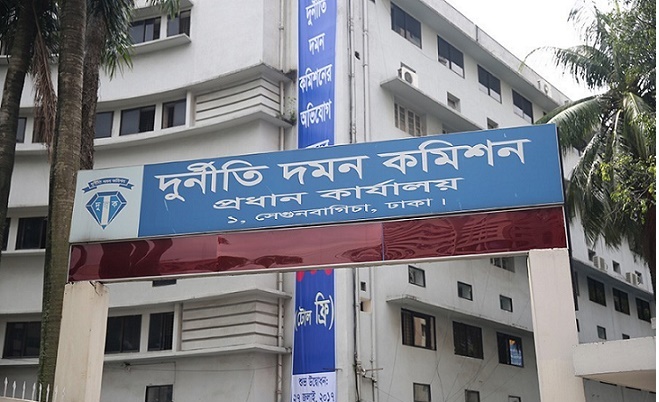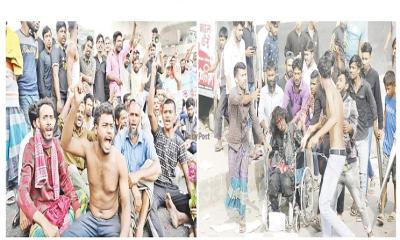-After 2009 ACC became loyal to rulers and was left without a clue
-"ACC should be reformed as an essential part of the radical changes in the state structure’
Dr Iftekharuzzaman, Executive Director, TIB
In the past 16 years, corruption and irregularities have spread in almost every sector of country. Although various initiatives were taken to eliminate them, the influential were out of touch. The Anti-Corruption Commission (ACC) was widely criticized for this.
However, this time ACC is working to bring influential corrupt people under the law. According to ACC sources, the ACC high command is willing to work fearlessly to gain the trust of the students. For this reason, the organization has started investigating the corruption of corrupt top bureaucrats-ministers and businessmen involved in irregularities of the previous government.
Hasnat Abdullah and Sarjis Alam, two coordinators of anti-discrimination student movement, recently met the Chairman of the Anti-Corruption Commission (ACC) Mohammad Moinuddin Abdullah. After the meeting, the coordinator Hasnat Abdullah said, many people are being sued in the ACC. Anti-discrimination student activists have nothing to do with these. ACC will do their work independently.
Another coordinator, Sarjis Alam, said, "If anyone extorts money using our name, we call on them to be handed over to the law enforcement agencies." It is known that the ACC started an investigation against some of the influential people discussed last May and June. Among them were former National Board of Revenue (NBR) official Matiur Rahman and former Inspector General of Police (IGP) Benazir Ahmed.
Apart from this, the ACC filed a case against Imran Hossain, the owner of Sadiq Agro, the former Director General (DG) of the Directorate of Health, Dr Abul Kalam Azad, in Corona report fraud case. From mid-July, the ACC activity has seen a slight slowdown. At that time, there were few cases, complaints or investigation decisions of the commission. However, after the formation of the interim government in the uprising of the students, the ACC is now shaking. The agency has started investigating and taking action against the corruption of once influential people.
According to ACC sources, ACC has started investigation against former Home Minister Asaduzzaman Khan Kamal and his five associates. They are accused of trading appointments in the Narcotics Control Directorate, police and fire services. According to ACC sources, the Bangladesh Financial Intelligence Unit (BFIU) has sought information on the assets of several influential people. If this information is available, the ACC can start investigating the corruption allegations of more influential people.
Among them are recently resigned Chairman of Bangladesh Securities and Exchange Commission (BSEC) Professor Shibli Rubaiyat-ul-Islam, former Minister of State for Posts, Telecommunications and Information Technology Junaid Ahmed Palak, former Managing Director (MD) of Dhaka WASA Taksim A Khan, Presidium member of Jubo League Mojibur Rahman Nixon Chowdhury and others.
The ACC is investigating former Awami League MP Abdus Sobhan Mia Golap for allegedly having multiple houses in the United States. ACC has filed a Mutual Legal Assistance Request (MLAR) to trace Sobhan's assets. Meanwhile, analysts believe that it is necessary to take initiatives to reform the laws and regulations of the ACC. According to them, there have been many allegations of corruption within the ACC in the past few years, and the ghosts within the agency should be banished. The necessary reforms in the ACC Act should be made. ACC needs to be restructured. If the ACC is fixed, they will work independently.
Dr Iftekharuzzaman, executive director of Transparency International Bangladesh (TIB), said that ACC also needs reform, "ACC should be reformed as an essential part of the radical changes in the state structure expected as a result of the student-people's movement in the new Bangladesh." Otherwise, the dream of establishing a corruption-free democratic and accountable state system to the people will remain elusive.
It is known that the Anti-Corruption Commission (ACC) took strong steps to fight corruption in 2007 during the caretaker government that assumed power through a one-eleven reshuffle. Action was taken against many influential people including top leaders of political parties in almost two years. But after the party government came to power in 2009, there was a change in the activities of the ACC. Gradually the organization became loyal to the rulers. With the passage of time, the ACC was left without a clue.
Several former and current top officials of the ACC said that the most brilliant time of the organization was in 2007 and 2008 or during the government of One-Eleven. Since then, loyalists have been appointed to the organization during the party government. There are also accusations of using it to suppress political opponents.
Even though some minor corruptors have been brought under the law, there are allegations against the Anti-Corruption Commission of inaction in the case of the influential ones. ACC was preceded by the Anti-Corruption Bureau, which was under the Prime Minister's Office. ACC officials said that when the Anti-Corruption Bureau existed, its activities were largely limited to taking action against those associated with opposition parties.
In this situation, there was intense pressure from donor countries and organizations to establish an independent anti-corruption commission. There is similar pressure from civil society. At one stage, during the BNP-Jamaat coalition government, an initiative was taken to form the commission in 2004. First, the anti-corruption law was passed. A selection committee was formed to appoint the commission. Finally, the ACC was formed by appointing the Chairman and Commissioner of the Commission.
The official said, at that time donors and civil society expected it to be a neutral, independent institution. Even the then BNP government cited the establishment of the ACC as an achievement and talked about its independence. But in fact, at that time, it was no longer real later.
ZH






